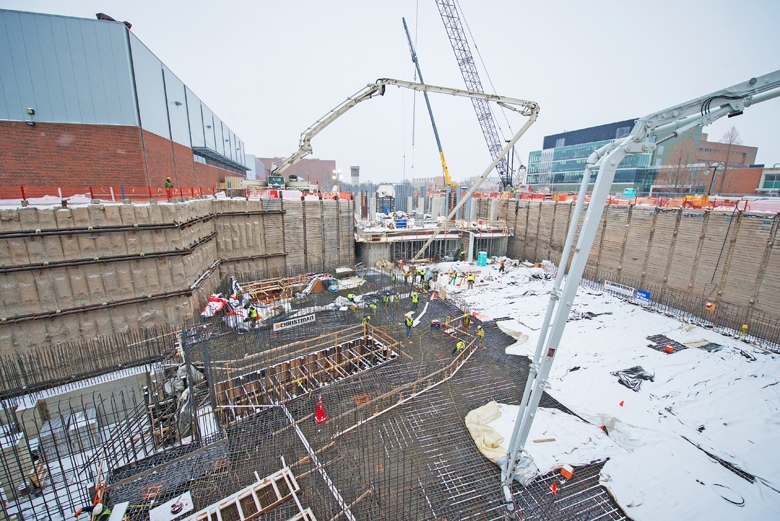Trades make big concrete bed for FRIB's linear accelerator
Date Posted: March 20 2015

EAST LANSING - If you want to build a Facility for Rare Isotope Beams (FRIB), you apparently need a pretty serious foundation. And that's just what Michigan's State University FRIB project got on March 3 - the project's linear accelerator tunnel was the site of a marathon, 25-hour concrete project that witnessed the placement of 3,563 cubic yards of concrete, poured from 350 trucks.
According to MSU, not snow, nor freezing rain nor the gloom of night stopped the concrete pour, which was enough to fill an Olympic-size swimming pool, or cover a football field 2 feet thick. Some 13,400 square-feet of concrete will have a thickness of 14 feet. It was the third and largest concrete pour on the project.
The $750 million FRIB is a new user facility for nuclear science, funded by the U.S. Department of Energy Office of Science and operated by MSU. Michigan State's bid for the unique project was chosen in national competition. The FRIB will enable scientists to make discoveries about the properties of rare isotopes in order to better understand the physics of nuclei, nuclear astrophysics, fundamental interactions, and applications for society, including in medicine, homeland security and industry.
A major part of that process, the linear accelerator tunnel (or Linac), will propel heavy proton beams up to half the speed of light. According to the project's architecture and engineering consultant SmithGroup, the process at Michigan State requires a "folded linac" - a variation on the structure with a more compact tunnel that better suits a dense college campus.
SmithGroup says the tunnel will include "sophisticated and robust mechanical and electrical systems to accommodate the heavy loads of the equipment integral to this study. The surface support building that caps the project features an articulated façade, conveying to the public some of the essence of what lies beneath."
In addition, the SmithGroup said the FRIB 's program requires "special elements incorporated into the design to shield against radiation. These include massive concrete walls – some with rare high-density aggregate –rolling steel shielding doors, and 10-ton steel blocks formed from melted-down nuclear battleships."
Barton Malow is acting as construction manager on the project. “We look forward to collaborating with the University and the entire project team throughout construction to deliver a state-of-the science and research facility," said Barton Malow President Ryan Maibach. The FRIB is expected to be operational in 2020.
Once complete, FRIB Conventional Facilities and Infrastructure Division Deputy Director and Project Engineer Chris Thronson told State News that MSU’s campus will house the only FRIB in the entire world, and it will be the most powerful linear accelerator of its kind.
 A 25-HOUR PARADE of cement mixers delivered and placed 3,563 cubic yards of concrete at the Facility for Rare Isotope Beams (FRIB) project at Michigan State University earlier this month.
A 25-HOUR PARADE of cement mixers delivered and placed 3,563 cubic yards of concrete at the Facility for Rare Isotope Beams (FRIB) project at Michigan State University earlier this month.
